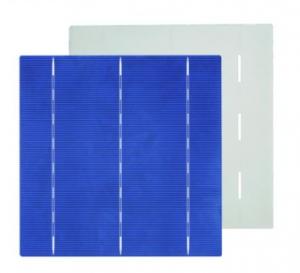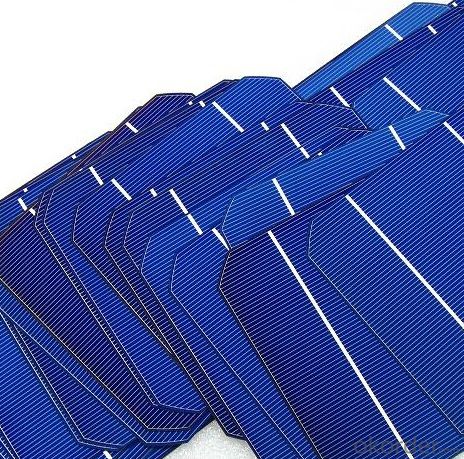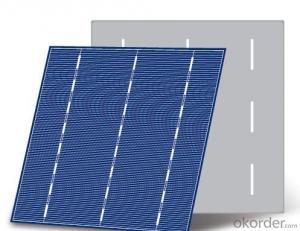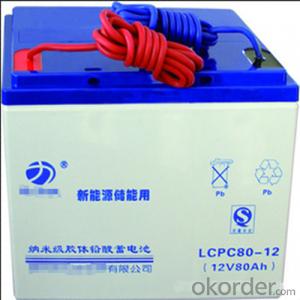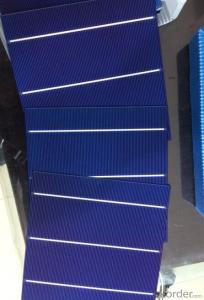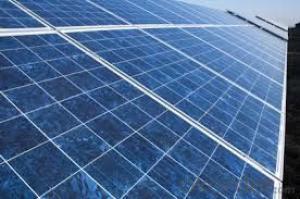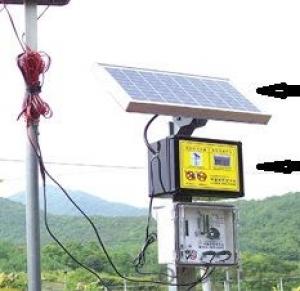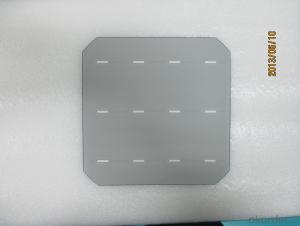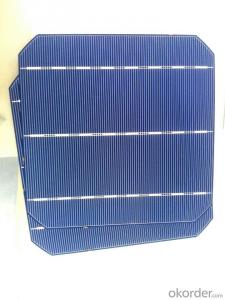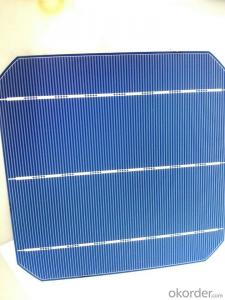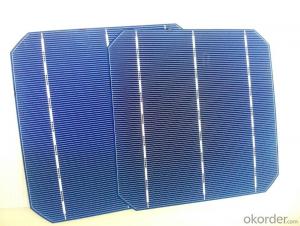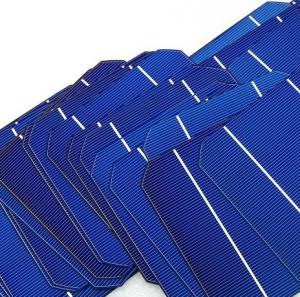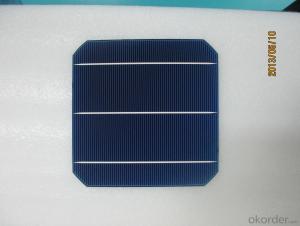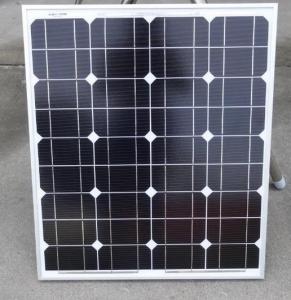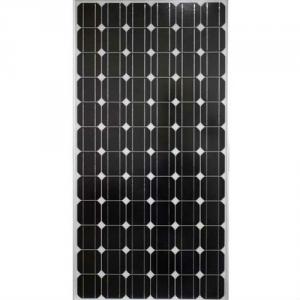Hyundai Solar Cells - Monocrystal Solar Energy Cell 156*156mm 18.5% Efficiency
- Loading Port:
- China Main Port
- Payment Terms:
- TT or LC
- Min Order Qty:
- -
- Supply Capability:
- 1000000 PCS/month
OKorder Service Pledge
OKorder Financial Service
You Might Also Like
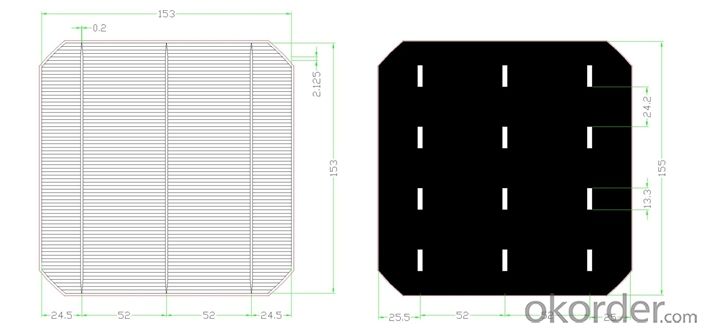
Monocrystal Solar Energy Cell
type:156M
appearance:156×1565㎜±0.5mm;diagonal:R=100mm
Main fence wide:1.5mm back electrode wide:2.8mm
Fence line qty:90
Cell thickness:220um±20um
Eff(%) | 18.00- 18.10 | 18.10- 18.20 | 18.20- 18.30 | 18.30- 18.40 | 18.40- 18.50 | 18.50- 18.60 | 18.60- 18.70 | 18.70- 18.80 | 18.80- 18.90 | 18.9- 19.0 | 19.1- 19.1 | 19.1- 19.2 |
Pm(W) | 4.30 | 4.33 | 4.35 | 4.37 | 4.40 | 4.42 | 4.44 | 4.47 | 4.49 | 4.5 | 4.54 | 4.56 |
Isc(A) | 8.71 | 8.73 | 8.76 | 8.77 | 8.78 | 8.82 | 8.83 | 8.85 | 8.86 | 8.88 | 8.9 | 8.93 |
Im(A) | 8.19 | 8.21 | 8.24 | 8.26 | 8.30 | 8.33 | 8.35 | 8.39 | 8.42 | 8.45 | 8.47 | 8.51 |
Voc(V) | 0.630 | 0.631 | 0.632 | 0.633 | 0.634 | 0.634 | 0.635 | 0.636 | 0.637 | 0.637 | 0.638 | 0.64 |
Vm(V) | 0.527 | 0.528 | 0.529 | 0.531 | 0.531 | 0.532 | 0.534 | 0.534 | 0.535 | 0.536 | 0.537 | 0.538 |
FF(%) | 78.6 | 78.7 | 78.8 | 79.0 | 79.2 | 79.3 | 79.5 | 79.6 | 79.8 | 80 | 80 | 80 |

remark:our company cells as per working current concentrate principle,separate the first and the second grade
Factory Picture of Solar Cells
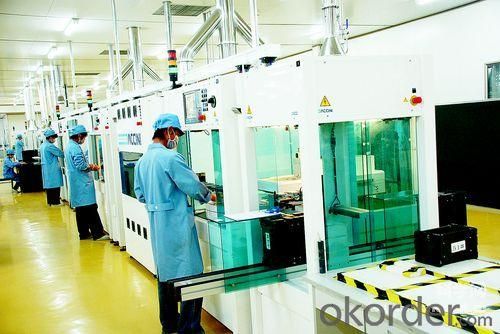
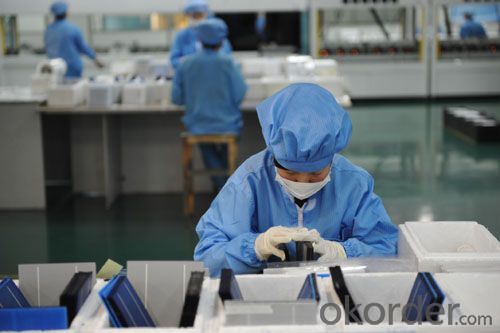
FAQ
We have organized several common questions for our clients,may help you sincerely:
What’s price per watt?
A: It’s depends on the quantity, delivery date and payment terms of the order. We can talk further about the detail price issue. Our products is high quality with lower price level.
Can you tell me the parameter of your solar cells?
We have different series of cells with different power output, both from c-si to a-si. Please take our specification sheet for your reference.
How do you pack your products?
We have rich experience on how to pack the panels to make sure the safety on shipment when it arrives at the destination.
Can you do OEM for us?
Yes, we can.
How long can we receive the product after purchase?
In the purchase of product within three working days, We will arrange the factory delivery as soon as possible. The perfect time of receiving is related to the state and position of customers. Commonly 7 to 10 working days can be served.
- Q: Can solar cells be used to power wireless communication networks?
- Yes, solar cells can be used to power wireless communication networks. Solar cells convert sunlight into electricity, which can be used to power various devices including wireless communication equipment. This is particularly useful in remote areas or during power outages, where solar energy can provide a sustainable and reliable source of power for wireless communication networks.
- Q: Can solar cells be used in remote areas with no grid access?
- Yes, solar cells can be used in remote areas with no grid access. Solar cells convert sunlight into electricity, making them an ideal solution for remote areas where traditional power grids are not accessible. These off-grid solar systems can provide a reliable and sustainable source of electricity for various applications such as lighting, charging small devices, and powering basic appliances. Additionally, advancements in battery storage technology allow excess energy generated during the day to be stored and used during the night, ensuring continuous power supply even in remote areas without grid access.
- Q: How do solar cells perform in areas with frequent thunderstorms?
- Solar cells can still perform well in areas with frequent thunderstorms, as thunderstorms do not directly affect the efficiency of solar cells. However, during thunderstorms, the amount of sunlight reaching the solar cells may be reduced due to cloud cover, which can temporarily lower their energy production.
- Q: How do solar cells convert sunlight into electricity?
- Solar cells convert sunlight into electricity through a process called the photovoltaic effect. When sunlight hits the solar cell, the photons from the sunlight energize the electrons in the cell's semiconductor material, causing them to break free from their atoms. This creates an electric current, which can then be harnessed and used as electricity.
- Q: Can solar cells be used for powering remote sensors?
- Yes, solar cells can be used to power remote sensors. Solar cells convert sunlight into electricity, making them ideal for remote locations where other power sources may be unavailable. By harnessing the sun's energy, solar cells can provide a reliable and sustainable power supply for remote sensors, ensuring their continuous operation without the need for frequent battery replacements or wired connections to the grid.
- Q: How do solar cells perform in coastal areas?
- Solar cells can perform well in coastal areas, as they can take advantage of the abundant sunlight and reflectivity from the water. However, the salty and humid environment may cause corrosion and reduce their efficiency over time, making regular maintenance and protective measures necessary to ensure optimal performance.
- Q: Can a solar cell be used in commercial buildings?
- The answer is absolutely yes!
- Q: What is the typical warranty for solar cells?
- The typical warranty for solar cells varies, but it is commonly around 25 to 30 years for the performance warranty and 10 to 15 years for the product warranty.
- Q: How do solar cells perform in high altitude locations?
- Solar cells generally perform better in high altitude locations compared to lower altitude areas. This is because higher altitudes often have less atmospheric interference, such as pollution and cloud cover, which can obstruct sunlight. Additionally, the thinner atmosphere at high altitudes allows for more direct and intense sunlight, resulting in increased solar energy generation. Overall, solar cells in high altitude locations can harness more sunlight and produce higher energy output.
- Q: Can solar cells be used in powering e-bikes?
- Yes, solar cells can be used to power e-bikes. Solar panels can be installed on the e-bike to convert sunlight into electricity, which can then be used to charge the e-bike's battery. This allows for a sustainable and renewable source of energy to power the e-bike, reducing reliance on traditional electricity sources.
Send your message to us
Hyundai Solar Cells - Monocrystal Solar Energy Cell 156*156mm 18.5% Efficiency
- Loading Port:
- China Main Port
- Payment Terms:
- TT or LC
- Min Order Qty:
- -
- Supply Capability:
- 1000000 PCS/month
OKorder Service Pledge
OKorder Financial Service
Similar products
Hot products
Hot Searches
Related keywords
